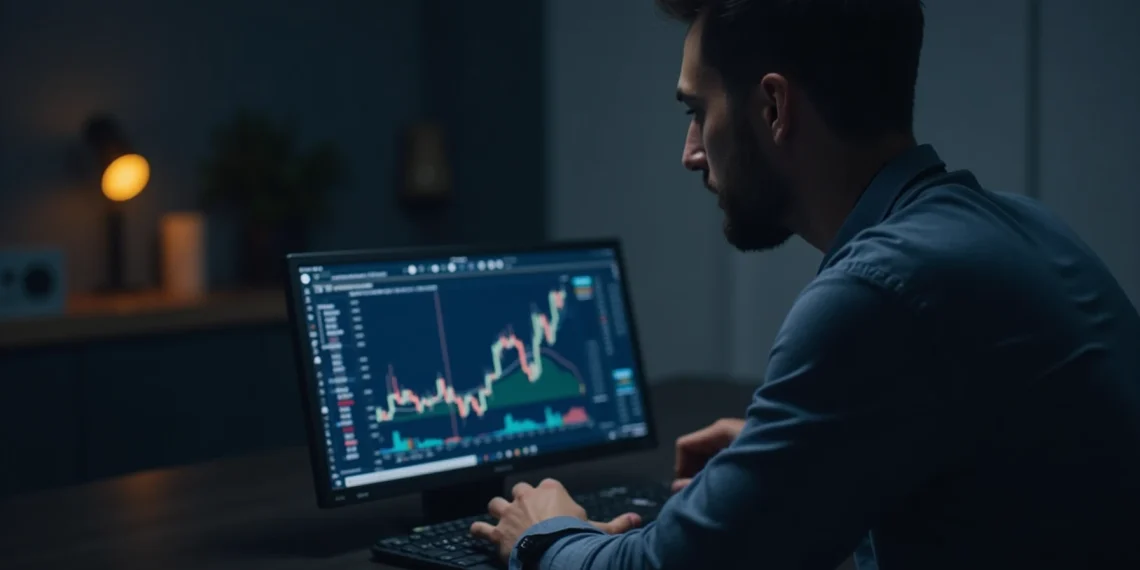<h2>Understanding Swing Trader Psychology</h2>
<p>In the fast–paced world of cryptocurrency trading, swing traders often face unique psychological challenges. Studies show that 48% of traders attribute their losses to emotional decision–making rather than market conditions. For instance, with the volatility seen in 2024, where Bitcoin‘s value fluctuated by over 150%, understanding your mindset can substantially improve performance.</p>
<h2>The Importance of Emotional Control</h2>
<p>Emotional control is crucial for swing traders. Without it, fear and greed can lead to impulsive decisions. Imagine standing at the edge of a pool; without taking a breath and diving in, you may miss out on great opportunities. According to a report by <a href=“https://hibt.com“>hibt.com</a>, disciplined traders are 35% more likely to achieve consistent profits.</p>
<h2>Common Psychological Traps in Trading</h2>
<ul>
<li><strong>Fear of Missing Out (FOMO):</strong> As new altcoins emerge, like the potential of 2025‘s hottest coins, FOMO can cloud judgment, leading to hasty trades.</li>
<li><strong>Loss Aversion:</strong> Many traders find it hard to accept losses, often holding onto losing positions in hopes of recovery.</li>
<li><strong>Overconfidence:</strong> After a few successful trades, traders may become overly confident, leading to reckless decisions.</li>
</ul>
<h2>Practical Tips for Managing Your Mindset</h2>
<p>Managing trader psychology requires conscious effort. Here are some strategies to enhance your mental game:</p>
<ul>
<li><strong>Set Clear Goals:</strong> Define your trading goals and stick to them!</li>
<li><strong>Create a Trading Plan:</strong> Outline your entry and exit strategies. Following a structured plan can mitigate emotional decision–making.</li>
<li><strong>Practice Mindfulness:</strong> Techniques such as meditation can help in maintaining focus and clarity.</li>
</ul>
<h2>Leveraging Data for Better Decisions</h2>
<p>As we dive deeper into swing trader psychology, keeping data analysis at the forefront is essential. In Vietnam, the rise of digital asset users has increased by 47% in 2024, which highlights the need for improved emotional intelligence among traders.</p>
<p>Many trading platforms, like OKHTX, offer features to analyze market trends effectively. Using data–driven approaches can help you navigate those emotional pitfalls and bolster your confidence.</p>
<h2>Final Thoughts on Swing Trader Psychology</h2>
<p>Ultimately, mastering your mental approach to swing trading can lead to significant advantages in the volatile crypto landscape. By being aware of the psychological factors at play and implementing strategies like those mentioned above, traders can enhance their performance on platforms like OKHTX.</p>
<p>Remember, trading is not just about numbers; it’s equally about understanding yourself. So, embrace the psychological aspects and thrive in your trading journey!</p>
<p>In the fast–paced world of cryptocurrency trading, swing traders often face unique psychological challenges. Studies show that 48% of traders attribute their losses to emotional decision–making rather than market conditions. For instance, with the volatility seen in 2024, where Bitcoin‘s value fluctuated by over 150%, understanding your mindset can substantially improve performance.</p>
<h2>The Importance of Emotional Control</h2>
<p>Emotional control is crucial for swing traders. Without it, fear and greed can lead to impulsive decisions. Imagine standing at the edge of a pool; without taking a breath and diving in, you may miss out on great opportunities. According to a report by <a href=“https://hibt.com“>hibt.com</a>, disciplined traders are 35% more likely to achieve consistent profits.</p>
<h2>Common Psychological Traps in Trading</h2>
<ul>
<li><strong>Fear of Missing Out (FOMO):</strong> As new altcoins emerge, like the potential of 2025‘s hottest coins, FOMO can cloud judgment, leading to hasty trades.</li>
<li><strong>Loss Aversion:</strong> Many traders find it hard to accept losses, often holding onto losing positions in hopes of recovery.</li>
<li><strong>Overconfidence:</strong> After a few successful trades, traders may become overly confident, leading to reckless decisions.</li>
</ul>
<h2>Practical Tips for Managing Your Mindset</h2>
<p>Managing trader psychology requires conscious effort. Here are some strategies to enhance your mental game:</p>
<ul>
<li><strong>Set Clear Goals:</strong> Define your trading goals and stick to them!</li>
<li><strong>Create a Trading Plan:</strong> Outline your entry and exit strategies. Following a structured plan can mitigate emotional decision–making.</li>
<li><strong>Practice Mindfulness:</strong> Techniques such as meditation can help in maintaining focus and clarity.</li>
</ul>
<h2>Leveraging Data for Better Decisions</h2>
<p>As we dive deeper into swing trader psychology, keeping data analysis at the forefront is essential. In Vietnam, the rise of digital asset users has increased by 47% in 2024, which highlights the need for improved emotional intelligence among traders.</p>
<p>Many trading platforms, like OKHTX, offer features to analyze market trends effectively. Using data–driven approaches can help you navigate those emotional pitfalls and bolster your confidence.</p>
<h2>Final Thoughts on Swing Trader Psychology</h2>
<p>Ultimately, mastering your mental approach to swing trading can lead to significant advantages in the volatile crypto landscape. By being aware of the psychological factors at play and implementing strategies like those mentioned above, traders can enhance their performance on platforms like OKHTX.</p>
<p>Remember, trading is not just about numbers; it’s equally about understanding yourself. So, embrace the psychological aspects and thrive in your trading journey!</p>

















